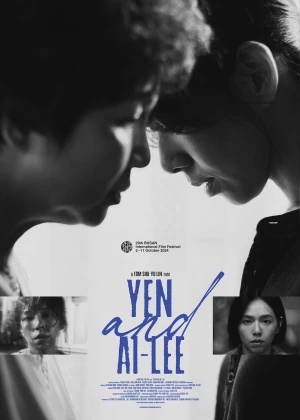Yen and Ai-Lee

It's been a while, but Tom Lin is back with a new feature film. He's not the most prolific of directors, but he's a stickler for quality, and he hasn't made a bad film yet. When I saw the ads for Yen and Ai-Lee [Xiao Yan Yu Wu Ai Li], it was clear this was going to be his most arthouse-leaning project to date, but I trusted him to make something good with it, and I'm happy to see he didn't disappoint me in the slightest. Like most of his work, availability will be the biggest hurdle to overcome, so fingers crossed the film will at least find its audience.
![screencap of Yen and Ai-Lee [Xiao Yan Yu Wu Ai Li]](/thumbs/img/articles/1200xauto/yen-ai-lee-1.webp)
Tom Lin has been around for a while. Winds of September was released around the time I got serious about Asian cinema (beyond what Japan had to offer), Starry Starry Night was part of a set of Taiwanese films that showed unbridled creativity and a willingness to break free for the New Wave. Whatever direction he strays in, Lin stands for a refined aesthetic coupled with an emotional core that keep each other in perfect balance. Yen and AI-Lee is no exception, even when stylistically this is his most traditional film to date.
Yen and AI-Lee is one of those films where the lead character is notably absent. Instead, we only see the fallout of his actions and the almost irreparable damage they caused to the people around him. The extent of the damage and the impact on the individual characters and their mutual relationships is revealed little by little, but be aware this is a film that requires a bit of work from the audience, even when the story itself it simple and straightforward. Yes, this is a drama at heart, but structurally it has a setup more similar to mystery and thriller films.
After being away for 8 years, Yen returns to her hometown. She goes to live with her mother, but the relationship between the two has soured. Yen has trouble finding a job and feels ill at ease in town because of her troubled past. To complicate things even further, her father's mistress dumps her half-brother with Yen and leaves him with no means to contact her. The boy has nowhere else to go, so Yen decides to take care of him. Yen's mother is livid when she hears the news, which prompts Yen to leave home and go live in a nearby city, where she finds a job in a laundry factory.
![screencap of Yen and Ai-Lee [Xiao Yan Yu Wu Ai Li]](/thumbs/img/articles/1200xauto/yen-ai-lee-2.webp)
One of the things that immediately stands out is the stark black-and-white cinematography. I'm not an unequivocal fan as colors are a great (abstract) way to communicate emotion, but when done right, I can appreciate it. A lot more weight rests on framing, lighting, and contrast, and cinematographer Kartik Vijay understood the assignment. The film looks stunning, every shot oozes style and refinement, only the camera work is a little static for my taste. I get the more minimalist movements and editing underline its arthouse intensions, it was just a little too expected.
The score is good but just a tad too classical for my taste. It's in line with the cinematography, but it lacks that little extra polish to give it a more contemporary and distinctive feel. That's not to say the music is bad, it fits the film like a glove and it definitely adds to the emotional depth of key scenes, it's just that it was too expected to leave a strong and lasting impression. It's a returning issue for Chinese and Taiwanese films, and I fear Lin won't be the one to turn this around, but at least the quality is there.
The performances are stellar. It's always a bit of a risk when a director casts a relative for the lead role (actress Kimi Hsia is Lin's spouse), but Hsia obliterates all suggestions of nepotism with her captivating performance. She hits all the right emotions without the need to be overly expressive or sentimental. There's also great on-screen chemistry between Hsia and Kuei-Mei Yang, which grounds the relationship between the characters. The secondary parts are solid too, but they fade rather quickly compared to the central duo.
![screencap of Yen and Ai-Lee [Xiao Yan Yu Wu Ai Li]](/thumbs/img/articles/1200xauto/yen-ai-lee-3.webp)
Lin is surprisingly sparse with information during the first half of Yen and AI-Lee. I guess you could say it's part of the film's arthouse identity, but it made me think more of mystery/thriller combos where certain events are kept hidden to create tension and intrigue. I do feel it worked well here, as it's never in the way of the drama, but I could see how this might bother some people, especially those looking for a more tranquil and meditative experience. Personally, I liked the added flavor to what would've been a lovely but otherwise pedestrian drama.
While not Tom Lin's best film to date, it is a testament to his ability to deliver quality regardless of the type of film he's directing. He's been floating between genre, arthouse, and drama, shifting the balance between them in each of his films, while delivering a relatively consistent experience. Yen and AI-Lee is Lin's most arthouse-leaning film, drawing its power from impressive performances and impeccable styling choices that support a strong dramatic core. I wish he were quicker in releasing new films, but when the quality is this high and this consistent, there's not much to complain about.